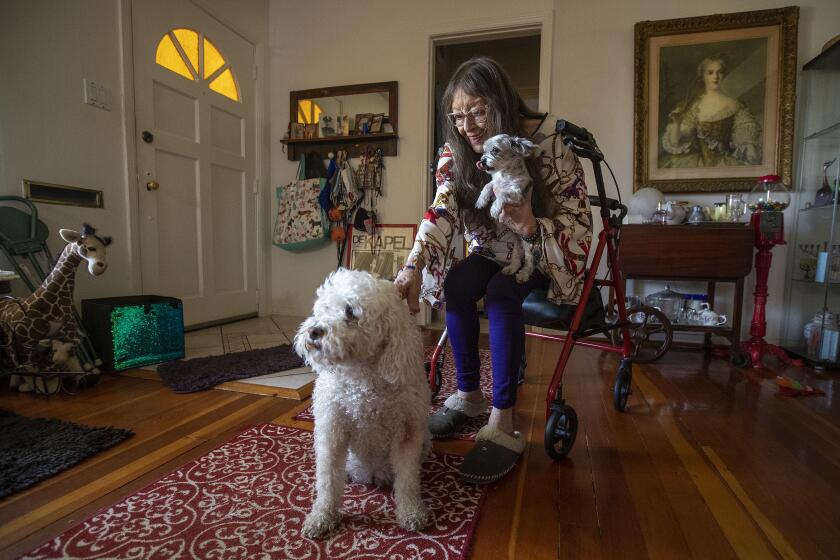The thought of ending up old and alone can be terrifying. It doesn’t have to be that way

Dear Liz: My wife and I have no children to take care of us in our old age, and I am scared to death regarding what will happen to the surviving spouse when one of us dies or we become incapacitated. We are 69 and 67 respectively and I think a lot of “boomers” are facing this issue. Any thoughts?
Answer: Consider getting a copy of the book “Essential Retirement Planning for Solo Agers: A Retirement and Aging Roadmap for Single and Childless Adults” by certified retirement coach Sara Zeff Geber. The NextAvenue site also has a wealth of information on how to prepare for aging and incapacity if you don’t have kids or don’t have ones you can rely on.
Geber provides far too much valuable information to summarize here, but one important strategy is to create a strong social network. Not only can this combat social isolation and loneliness — which are as dangerous to your health as smoking — but these folks can help look out for you and vice versa.
If your social circle is small or you’re out of the habit of making new friends, consider activities that put you in contact with others such as volunteering, taking classes or joining exercise groups. Also check out the Village to Village Network, a nonprofit that helps people age in place by encouraging groups of neighbors to help one another with rides, services and activities.
Living in close proximity to others and in areas with robust social services also can make a huge difference for solo agers. Another option, if you have the means, is to consider a continuing care retirement community that allows independent living to start, with assisted living and sometimes nursing home care as needed.
Every adult needs an advance healthcare directive, such as the free ones at Prepare for Your Care. These documents allow someone you trust to make health decisions if you should become incapacitated. It’s OK to name your spouse, but you also should have at least one and preferably two or more backups. Filling one out can help you think deeply about the people currently in your life you can trust with this task, and may encourage you to deepen those ranks if they’ve gotten a little thin.
Adult centers run by Valley InterCommunity Council offer support for those in isolation. ‘If you know anybody that’s old like me, and, you know, needs a friend, I would love that’
Roth IRA withdrawal rules
Dear Liz: In a recent column you mentioned that you can take money out of a Roth IRA at age 59½ without a penalty. I believe a Roth IRA must be in force for at least five years before you can take money out, regardless of age. Is this correct?
Answer: At any time and at any age, you can withdraw an amount equal to what you contributed to a Roth IRA. So if you’ve contributed $5,000 a year for four years to a Roth, you can withdraw $20,000 without worrying about taxes or penalties.
The five-year rule kicks in when you start to withdraw earnings. You can avoid both taxes and penalties on these withdrawals if the account was established at least five years ago and you’re 59½ or older. If the account isn’t at least 5 years old, you must pay taxes on the earnings withdrawn but don’t have to pay the usual 10% penalty if you’re 59½ or older.
A five-year rule also applies to Roth conversions. Each conversion or rollover you make is subject to a separate five-year waiting period.
Leaving a home to your heirs rather than bequeathing it to them through a will or trust could cost them more in taxes down the line.
Taxes on home sales
Dear Liz: I thought that if you occupied a home as your principal residence for two of the last five years that you could exclude capital gains of up to $250,000 if single or $500,000 if married. Someone recently told me that this has been changed to a pro-rata calculation.
Answer: That someone was wrong. The pro-rata calculation applies to people who have not owned and lived in the home for at least two years but who meet other criteria for a partial exemption. The percentage of gains you can exclude from your income is based on the percentage of the two-year requirement you fulfilled.
Let’s say you had to sell the home after a year because your place of employment changed to one at least 50 miles away. You could exclude capital gains of up to 50% of the exemption amount — $125,000 if single or $250,000 if married — from your income.
Liz Weston, Certified Financial Planner, is a personal finance columnist for NerdWallet. Questions may be sent to her at 3940 Laurel Canyon, No. 238, Studio City, CA 91604, or by using the “Contact” form at asklizweston.com.
More to Read
Inside the business of entertainment
The Wide Shot brings you news, analysis and insights on everything from streaming wars to production — and what it all means for the future.
You may occasionally receive promotional content from the Los Angeles Times.












